Zlata Đurđević: If I Am Not Elected by Sabor, I Will Not Apply After New Public Call
ZAGREB, 25 May, 2021 - President Zoran Milanović's candidate for the Supreme Court president, Zlata Đurđević, said on Tuesday that she would not apply again for the post if she was not elected by the parliament because she did not feel the need to further participate in political processes.
"If the parliament does not elect me, I will not apply after a new public call by the State Judicial Council. I have put myself at the head of state and parliament's disposal with my competence, integrity and responsibility. If they do not support it, I will not apply for the position again. I have my vocation and job that I find entirely fulfilling and I have no need to further participate in political processes," Đurđević told reporters after a session of the parliamentary Judiciary Committee, which she attended as an external member.
"The Committee has made a very good decision and I think that all candidates should be interviewed because the Committee must decide on all candidates transparently and give its opinion," she said in a comment on the Judiciary Committee's decision to invite and interview all five candidates for the Supreme Court president so it could discuss their programmes.
"I expect the parliament to make a decision in line with the Constitution and laws," she said when asked to comment on the fact that she did not enjoy the support of the ruling HDZ party, stressing that she was not in a political battle and did not intend to comment on whether she stood a political chance of being elected.
"I was proposed to the post by the President of the Republic, I applied following a public call and I did not violate any law. I did not apply after the first public call just like many other qualified candidates did not. The prime minister, too, meets the conditions to be the president of the Supreme Court and he did not apply. He has his own reasons and I had my own. I did not believe that the head of state would nominate me. Also, at that time I was in the process of selection for a judge at the European Court of Human Rights and, simply put, I do not apply for more than one position at a time," she said when asked about disputes regarding her candidacy.
"When the President of the Republic offered me (the nomination), I accepted it, and that happened after he said that he would not back any of the candidates who applied for the position at the time, which means that at that moment the first public call ended because he (President) is the authorised proposer. After that, I told him that I was willing to apply after a second public call was published, and I did so," Đurđević said, dismissing once again the possibility that she had acted unlawfully and noting that the possibility of repeating the public call was created only following a subsequent decision to that effect by the Constitutional Court.
For more about politics in Croatia, follow TCN's dedicated page.
87 Municipalities, 57 Cities, 14 Counties to Hold Runoffs on Sunday
ZAGREB, 25 May, 2021 - After the repeat of local polls in seven municipalities and cities last Sunday, the State Electoral Commission (DIP) on Tuesday said that the second round of the election would be held for 87 municipal mayors, 57 city mayors including the mayor of the capital city of Zagreb and 14 county prefects on 30 May.
There are total of of 432 cities and municipalities where the second round of the elections is to be held or at 5,497 polling stations on Sunday, 30 May.
DIP recalls that the local elections will be repeated at eight polling stations in the Municipality of Kneževi Vinogradi as well as at one polling station in the election for city councillors in the Varaždin City Assembly on 30 May.
For more about politics in Croatia, follow TCN's dedicated page.
Judiciary Committee to Interview All Candidates For Supreme Court President
ZAGREB, 25 May, 2021 - Croatia's Supreme Court on Tuesday pointed to examples of arbitrary criticism made by some politicians and individuals against the judiciary "which leads to the general inclination to express tendentious extreme views".
This may be a consequence of a lack of experience and knowledge that is acquired through work in courts or the absence of a complete understanding of the work of judges, as well as of the wish of protagonists in the public life to gain popularity in their political community, counting on the fact that the professional status of judges requires from them to refrain from conflicts that happen in the public sphere, the Supreme Court says in its statement.
Expedient and rigid opinions on functioning of judiciary
"The media space is occupied by individuals with minimum or no experience who express expedient and rigid opinions on the functionality of the judicial authorities and the ethical deficit allegedly prevailing among judicial officials," the Supreme Court warns.
The Court says that such arbitrary attitudes, which are not based on serious and comprehensive analyses, could be heard from the President of the Republic (Zoran Milanović), some parliamentary deputies and some members of the academic community and lawyers.
Encouraging and promoting general intolerance towards judges, by branding them as "an isolated hedonistic community which exists per se and does not answer to anyone" is unacceptable, says the Supreme Court.
The work of judges is exposed to public scrutiny and is also liable to disciplinary and criminal proceedings as established by the law, the Court says.
It also dismisses claims made by law professor Zlata Đurđević, an applicant for the position of the new Supreme Court president, about the judicial authorities having become "an autonomous and isolated professional organisation" that elects and dismisses judges on its own, according to criteria it defines on its own.
The Supreme Court says that ideas about the need to reduce the acquired independence and autonomy of the judicial authorities are contrary to the Croatian Constitution and the EU acquis.
CCEJ: Politicians should not use simplistic or demagogic arguments
The Croatian Supreme Court recalls that the Consultative Council of European Judges (CCEJ), a body of the Council of Europe, has stated in its opinion on safeguarding the independence of the judiciary that "politicians should not use simplistic or demagogic arguments to make criticisms of the judiciary during political campaigns just for the sake of argument or in order to divert attention from their own shortcomings."
"Neither should individual judges be personally attacked. Politicians must never encourage disobedience to judicial decisions let alone violence against judges, as this has occurred in some member states," the CCEJ said in its press release in 2019, as quoted by the Croatian Supreme Court in its statement issued after its meeting on 18 May.
For more about politics in Croatia, follow TCN's dedicated page.
Employers Propose Continuation of Government COVID Subsidies
ZAGREB, 25 May, 2021 - The Croatian Employers' Association (HUP) has proposed measures for maintaining liquidity and launching private investments which include retaining jobkeeping measures and covering a portion of fixed costs, ensuring favourable loans and prolonging loan maturity.
In expectation of COVID measures and lockdown of businesses being lifted, HUP addressed Finance Minister Zdravko Marić and underscored that maintaining liquidity is not only relevant during the lockdown period but should be extended for a longer period, and that recovery can only be possible if investments are boosted.
HUP proposes that jobkeeping measures be extended even after busines restrictions are lifted until such time that all enterprises generate at least 90% of their pre-pandemic revenue in 2019. HUP believes that abolishing support measures for the economy should be gradual, depending on the epidemiological situation, but also on the circumstances in each individual sector so that Croatia is not faced with a wave of bankruptcies and layoffs.
HUP also calls for a portion of fixed costs to continue to be covered, taking account of the percentage revenue has decreased, and for facilitating access to loans for liquidity and working capital, including guarantee schemes for micro, small and medium-sized enterprises.
HUP advocates possibly transforming a portion of loans into grants and for the moratorium on loan maturities to be extended for existing loans, along with state guarantees, at least until the end of this year and longer if need be, based on transparent criteria.
HUP proposes additional support loans for exporters and enterprises investing in the 4.0 industry, and support for investments by large companies through increased support for EU co-funded projects.
It also recommends the possibility of deleveraging debts between companies to prevent a chain reaction, and for non-recoverable loans to be identified faster, as well as speeding up bankruptcy procedures, and introducing additional tax cuts.
"We believe that government subsidies to cover the disrupted economic activities due to the COVID crisis should continue until such time that enterprises can do business normally and save jobs without that support," HUP said.
For more about politics in Croatia, follow TCN's dedicated page.
PM Andrej Plenković: Decision on Croatia's Entry to Schengen Area Possibly in Second Half of Year
ZAGREB, 24 May, 2021 - Croatia hopes its entry to the Schengen area of passport-free travel could be put on the agenda during Slovenia's EU presidency in the second half of this year, Prime Minister Andrej Plenković said on Monday.
"I believe it is possible. We have excellent overall relations with Slovenia and it would be great if that happened during Slovenia's presidency of the Council of the EU," Plenković told reporters.
Plenković discussed Croatia's accession to the Schengen area and the euro area with European Council President Charles Michel and Home Affairs Commissioner Ylva Johansson.
Both the previous and current European Commission have confirmed that Croatia has met all technical criteria to enter the Schengen area and it is now up to the member-states, that is, the Council of the EU, to make a political decision on the matter.
Asked if he expected problems from some member-states, Plenković said that Croatia had succeeded in showing its partners through dialogue that it had met all criteria.
"I believe that we are heading towards a positive decision by the Council," he said.
The EC has said that on 2 June it will announce a new strategy for the Schengen area and two bills on changes to the Schengen evaluation mechanism and the Schengen Information System.
As for Croatia's other strategic goal, entry to the euro area, Plenković said that talks were underway with Executive Vice-President Valdis Dombrovskis and that Croatia could soon achieve that goal as well.
"I believe that we will manage to join the euro area in the next two years," said Plenković.
The Croatian PM and European Council President Michel discussed also the situation in Southeast Europe, notably Bosnia and Herzegovina.
Plenković said that Croatia supported its neighbours' European ambitions, underlining the need to amend Bosnia and Herzegovina's election law so that it could enable parliamentary elections in 2022 and be fair for all constituent peoples and other citizens.
For more about politics in Croatia, follow TCN's dedicated page.
Croatia PM to Attend EU Summit on Monday, Tuesday
ZAGREB, 23 May, 2021 - The leaders of the EU-27 will convene for a summit on Monday and Tuesday to discuss the meeting of climate protection targets, foreign policy issues and the COVID-19 situation.
This will be the first physical summit in Brussels since December.
While in Brussels, Croatian Prime Minister Andrej Plenković will hold talks with European Council President Charles Michel and European Commissioner for Home Affairs Ylva Johansson.
On the fringes of the European Council, Plenković is expected to talk about Croatia's two strategic goals - entering the eurozone and the Schengen Area.
For more about politics in Croatia, follow TCN's dedicated page.
For more news about Croatia, CLICK HERE.
PM: HDZ Is Centre-Right Party, Voters Should Vote According to Their Conscience
ZAGREB, 22 May 2021 - Prime Minister Andrej Plenković said on Saturday that his HDZ party was a centre-right, state-building, patriotic, people's, Christian democratic party, calling on voters to vote in the second round of local elections in Zagreb on 30 May according to their conscience.
"The party's position has not changed... we know our values and platform. We respect our voters and recommend that they vote according to their conscience in the runoff," Plenković said during a visit to Primorje-Gorski Kotar County.
Asked which of the two candidates for the Zagreb mayor, Tomislav Tomašević or Miroslav Škoro, would be easier to cooperate with, Plenković said that he respected voters' will.
"Whoever wins voters' trust is a collocutor to me as the prime minister. We have been pursuing a policy of balanced regional development in all parts of Croatia. It was never a problem for me to talk to representatives who are in the opposition at the national level and are in power in some part of the country. The same will apply to Zagreb," he said.
Vaccination as a way to achieve a better tourist season
Asked if current epidemiological restrictions could be relaxed sooner, that is on 27 May, as demanded by restaurant and bar owners, Plenković said that the epidemiological situation would be discussed in the coming week.
"The figures are very, very good. Compared to the week before, there are fewer infections, the number of people who have got vaccinated is growing, and vaccination provides protection against the worst outcomes. We must make decisions that will help maintain the current good trends and not jeopardise the tourist season," he said.
Plenković recalled that of the epidemiological restrictions, the only ones to remain in force were bans on events and gatherings of more than 25 people, on stay in indoor areas of restaurants and bars, and on indoor sport activities. As for everything else, we have been living more or less normally while other countries have had major restrictions, Plenković said.
Speaking of the tourist season, he said that it was up to Croatia to create conditions, through the vaccination of tourism workers and other workers in the services sector, that will help visitors stay safe.
Germany's decision very good, first wave of tourists in July
Germany has taken Croatia off the red list of countries with a high risk of coronavirus, and as of midnight on Sunday, Croatia will no longer be considered a high-risk but a risk region.
Commenting on this, Plenković said that the decision was good because Germany was one of Croatia's biggest tourist markets.
He noted that he had been in touch with state officials from other countries whose citizens could hardly wait to visit Croatia again and that the first bigger tourist wave was expected in July.
For more about politics in Croatia, follow TCN's dedicated page.
Highlights of the Week: 5 Big Events in Croatia from May 17-23, 2021
May 23, 2021 - TCN's highlights of the week. A look at the events in Croatia from May 17 through the selection of TCN's reporter Ivor Kruljac.
From Local elections to released details of the Euro 2020 championship strategy to the release of Zoran Mamić. Add Besana company attempting to boost its position in Croatia, and you have a truly exciting week. Here are the highlights.
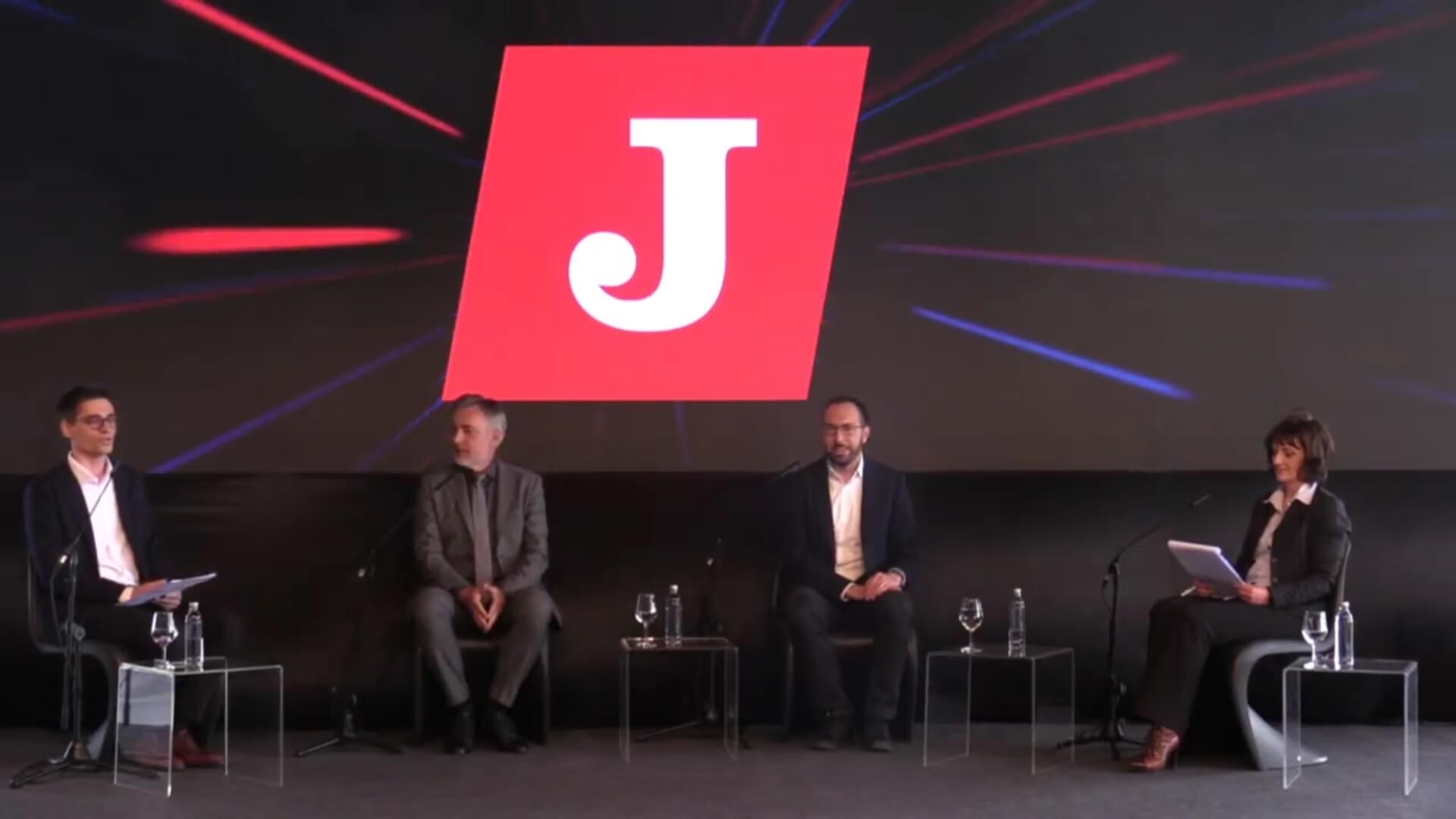
screenshot / Jutarnji list
Highlights of the Week: Zagreb mayor candidates Tomašević and Škoro had a debate ahead of the second round of elections
Jutarnji List invited on Friday mayoral candidates Miroslav Škoro (Homeland Movement), and Tomislav Tomašević of the green-left party We Can! to debate ahead of new elections.
In the first round of the elections, We Can! earned 147.631 votes (45.15%), while Homeland Movement had 39.789 votes (12.16%). Before officially entering the second round, Škoro declared Tomašević and We Can! party extreme left and pushed the narrative of elections as an ideological referendum among right-wing and conservative circles. Škoro also accused We Can! of being foreign mercenaries working for a philanthropist George Soros or wanting to revitalize Yugoslavia and Škoro's associate Zlatko Hasanbegović earlier in the week called We Can! a lesbian syndicate. Additionally, Nikola Grmoja (Most Party) stated for N1 that We Can! are Soroshians and accusations of their weird name-calling saw a random generator on the internet designed to mock these terms by random options of name-calling. Meanwhile, Tomašević continued the campaign talking about solutions to the problems Zagreb is currently facing but occasionally makes remark accusations while keeping it clean. The debate on Jutarnji List saw similar rhetoric from both candidates in their public performances, and overall, at least for the people of Zagreb, May 30 can't come soon enough.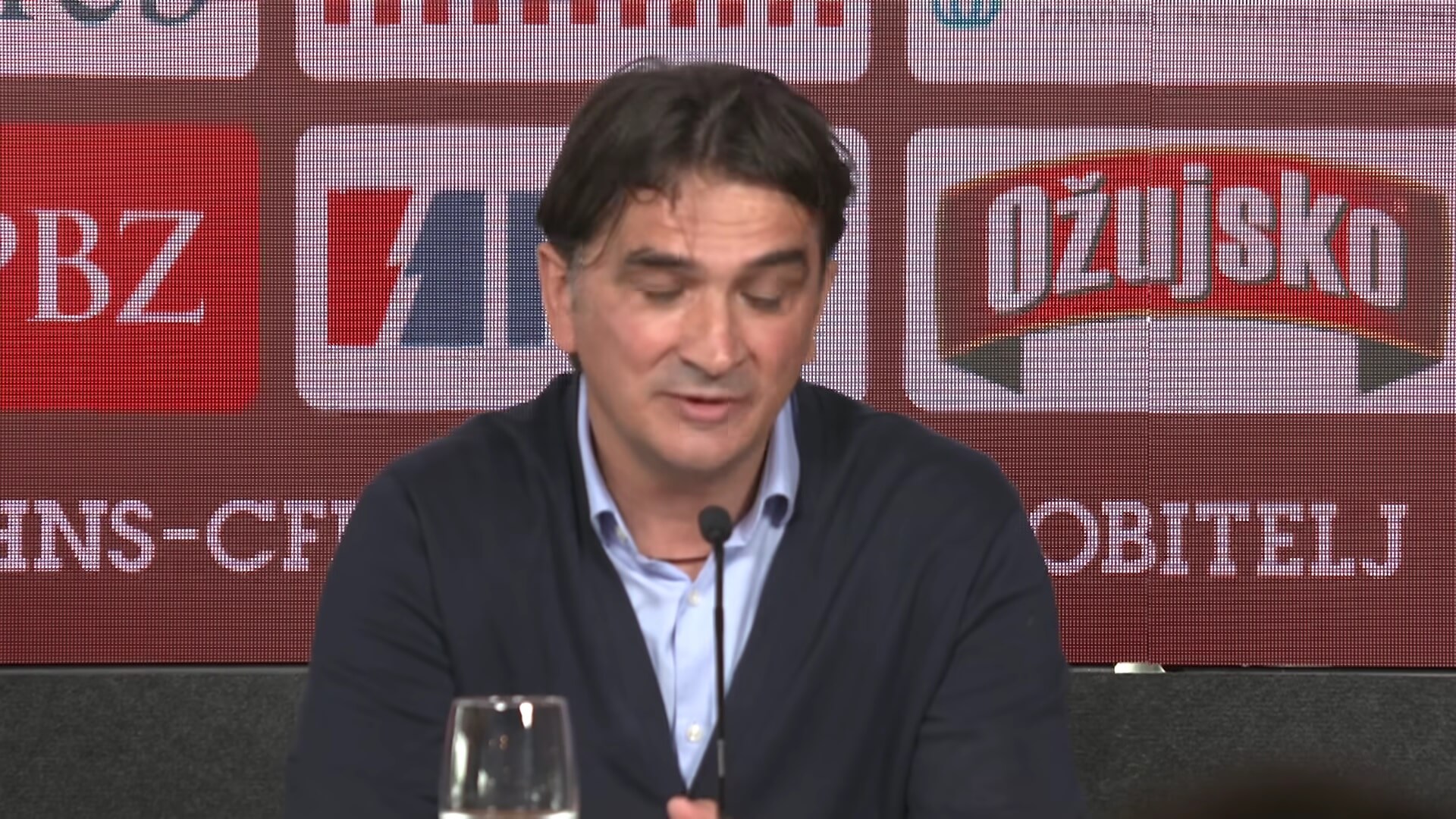
screenshot / Hrvatski nogometni savez
Highlights of the Week: Zlatko Dalić announces preliminary EURO 2020 Croatia player list
Coach Zlatko Dalic has announced the preliminary EURO 2020 Croatia player list on Monday. Luka Modrić (Real Madrid), Marcelo Brozović (Inter), Milan Badelj (Genoa), Mateo Kovačić (Chelsea) are some of the names that made it on the list.
The Croatia national team has entered the last month of preparations for the European Championship, which opens on June 13 at Wembley against England at 3 pm.

screenshot / RTL
Highlights of the Week: Zoran Mamić released from custody
Former Dinamo football coach Zoran Mamić will remain free while in Bosnia and Herzegovina; however, he will have to report to the police once a week, and his personal documents have been temporarily confiscated, the court in Bosnia and Herzegovina decided on Wednesday.
Zoran Mamić was arrested early Wednesday morning by officers from the State Investigation and Protection Agency (SIPA) based on an arrest warrant issued against him in Croatia.
After that, Mamić was handed over to the court in Sarajevo. Judge Branko Perić determined his status, including his citizenship of BiH. The judge ruled that Mamić would remain free with precautionary measures and was ordered to give in his personal identification documents.
The court did not discuss the matter of Mamić's extradition, considering that Croatia has not sent a formal request yet.
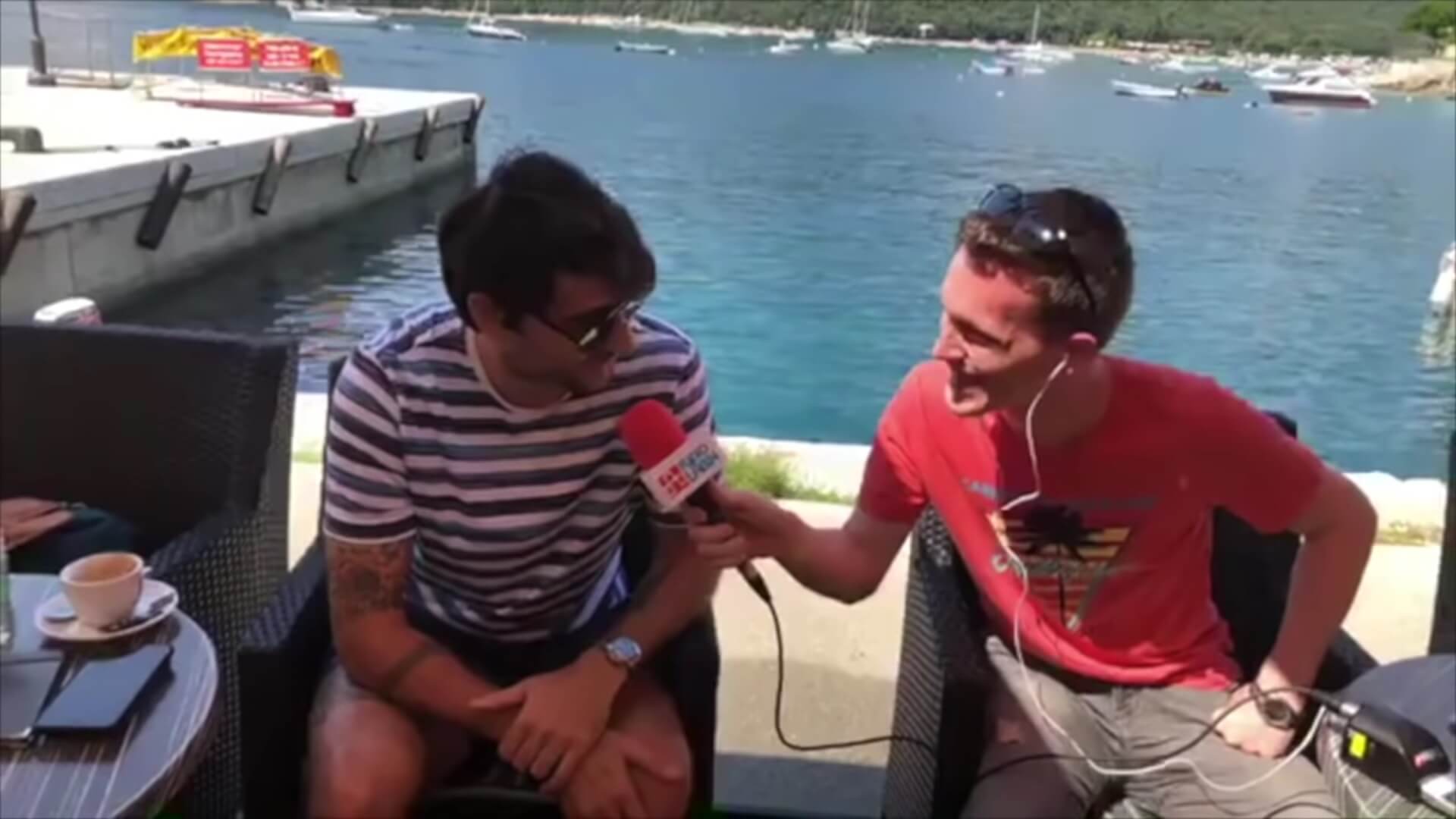
screenshot / Radio Labin
Highlights of the Week: Former football player Vedran Ćorluka new Croatian assistant coach
The new Croatia national team assistant coach Vedran Ćorluka was officially presented by coach Zlatko Dalić at a press conference in Zagreb ahead of EURO 2020.
Although there was a lot of speculation, Croatian football player Vedran Ćorluka officially announced the end of his playing career and was confirmed as the new Croatia assistant coach on Monday.
"I did not plan it, but the moment has come," said Ćorluka at the press conference at which coach Zlatko Dalić presented the list of players for the upcoming European Championship.
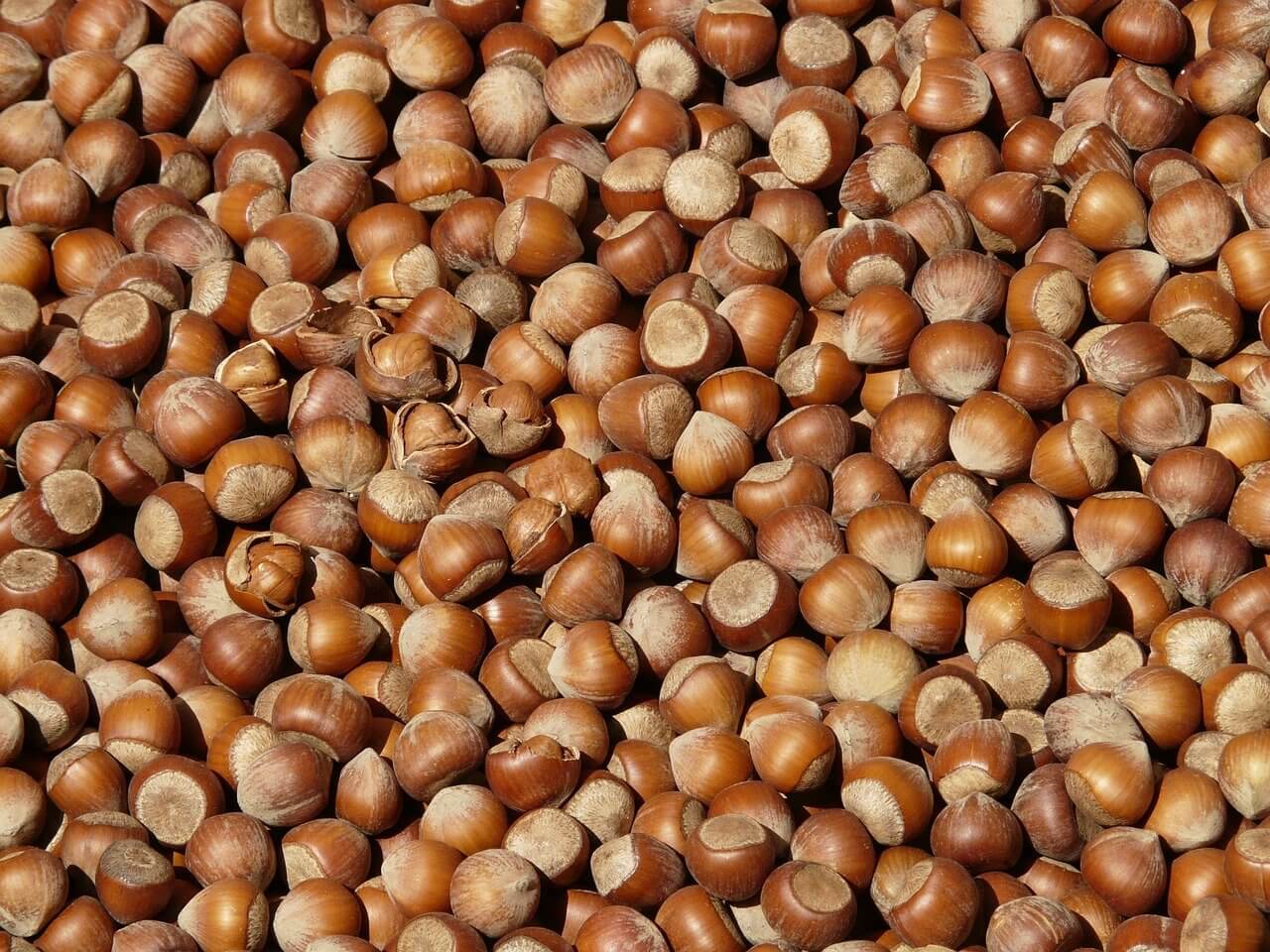
Pixabay
Highlights of the Week: Italian company Besana strengthening position in Croatia
The Italian company Besana, which is otherwise one of the strongest European companies in the production and processing of nuts and dried fruit, is working to further strengthen its position here in Croatia.
As TCN reported on Monday, the Italian company Besana currently has 50 subcontractors located in Croatia, from whom it buys about 100 tonnes of hazelnuts per year. But, much more can be expected if their plans go well.
To learn more about Croatia, have a look at our newly launched TC website.
For more about news in Croatia, follow TCN's dedicated page.
Milanović: Situation in Zagreb Hospital Should Have Been Dealt with Sooner
ZAGREB, 21 May 2021 - President Zoran Milanović said on Friday that the situation in Zagreb's KBC Sisters of Charity Hospital was a disastrous example of neglect and mismanagement, noting that Prime Minister Andrej Plenković should have dealt with that problem right away.
Milanović, who was visiting the northern Adriatic peninsula of Istria to attend an exhibition staged on the occasion of the 150th anniversary of the first national revival gathering of the Croats of Istria and Kvarner, commented on the Health Ministry having sent an inspection team to the hospital to investigate allegations of unlawful activities.
"I believe it is a disastrous example of neglect, mismanagement. It describes best what has been going on at that hospital for a year. After a conflict between the minister and a doctor working there, the case should have been solved by dismissing either him or her," he said.
Milanović's statement was a reference to Dijana Zadravec, the head of the hospital's radiology department, who has been replaced over poor interpersonal relations that have resulted in a large number of radiologists leaving the hospital and who claims that hospital funds are used for private interests and that corruption and crime are being covered up.
Zadravec has said that she is in conflict with "the heads of hospital departments who own private hospitals and work to the benefit of those hospitals while using the resources of the public health system."
The person in charge of deciding on the matter, the prime minister, let the situation escalate, said Milanović, noting that the PM could have dealt with it sooner.
"A year later, there is no one left... This is a serious matter and it must not happen because it undermines the little trust left in the health system," Milanović said.
Decision on fighter jets not made
Asked to comment on the purchase of fighter jets following media reports that Croatia has opted for used French aircraft, Milanović said that a decision had not been made.
"I don't know who published that because a decision has not been made, so (the reports) make no sense," he said.
Asked if he insisted on US planes, Milanović said that he had never insisted on US planes.
"I only said that the USA is our main partner, but that does not mean that we have to buy planes from them. I have been saying over the past year that I will support any choice the government makes. Both bids are good. One should take care of Croatia's interests," he said.
On COVID-19 passes
Commenting on COVID-19 passes, he said that if people got vaccinated more, there would be no need for those passes.
I will lay wreaths less and less
PM Plenković has said that there will be no joint laying of wreaths by state officials until the end of his term, to which Milanović today said that he would lay wreaths less and less, "except in cases of major national anniversaries."
He noted that apart from keeping florists working, wreaths were also a serious public sanitation problem because they attracted rodents.
"In the future, I will carry roses, a stone, a carnation wherever that is possible," he said, noting that the point was about commemorating people and events together.
"If he (Plenković) does not want it, so be it. We sat down at the table yesterday and did our job. According to his interpretation of the relations between the president and the prime minister, he was putting on an act. He was not, he was doing his job. I don't do all things I have to do with equal enthusiasm and pleasure either," said Milanović.
For more about politics in Croatia, follow TCN's dedicated page.
Friends of Croatia: British Embassy - Brexit an Opportunity to Deepen Already Good Relationship
May 20, 2021 - The fifth article in the series "Friends of Croatia: British Embassy", saw TCN reporter Ivor Kruljac sit down with the UK Ambassador Andrew Dalgleish and discuss all things regarding diplomatic relations between the UK and Croatia. Diplomatic relations are, overall, really good and developing well, with Brexit being a challenge, but also an opportunity for deeper bilateral cooperation between the two European nations.
The diplomatic relations between the UK and the Republic of Croatia were formally established on June the 24th, 1992.
Almost 29 years later, I found myself in front of the Ambassador's residence and being warmly greeted by Snježana Vukić, the British Ambassador's advisor for communications. If you're inclined to think in stereotypes, you would expect a cup of tea, but instead, the cup of coffee with the creamy flat white texture turned out to be a much better beverage during the interview—both for me and for the Ambassador.
''We can sit wherever you like'', said Ambassador Andrew Stuart Dalgleish as he welcomed me inside the premises. A warm, kind, competent communicator that evened out the serious conversation about diplomatic topics with occasional humorous remarks to ensure both had an enjoyable and informative talk. The pins of both British and Croatian flags on his left coat lapel turned out to be a visual clue to the notion the friendship the UK and Croatia has long since held is still going well.
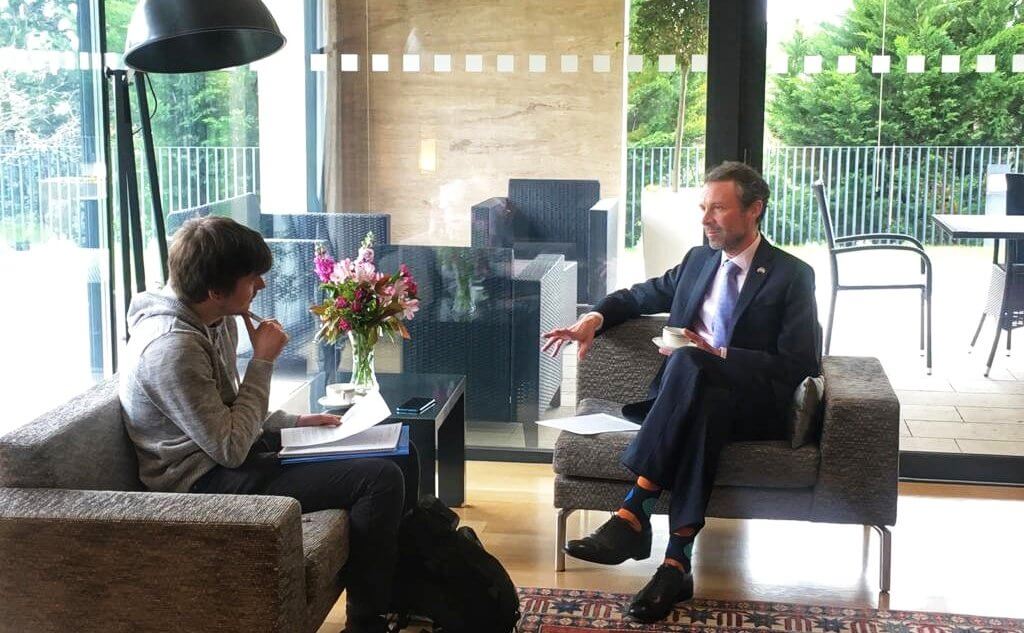
TCN reporter Ivor Kruljac with Ambassador Andrew Dalgleish © British Embassy Zagreb
Croatia and UK sharing western values
Andrew Dalgleish has served the UK as the Ambassador in Croatia since July 2016. He graduated with First Class Honours Degree in European Law at the University of Warwick, which included a year at Bordeaux University IV studying French Law. From 1998-1999 he worked in the Department of Social Security. His extensive knowledge of European law saw him work in UKREP (the United Kingdom Permanent Representation to the European Union) from 1999 to 2004, firstly as the Second Secretary for Social Affairs, and from May 2001 as a First Secretary for the Environment.
That same passion for the environment led him to DEFRA (Department for Environment, Food & Rural Affairs), where he was the Project Manager for the Climate Change effort during the UK Presidency of the EU, and he also represented the EU in UNFCCC plenary meetings. In his service to DEFRA from 2006 to 2008, he participated in the creation of the Office of Climate Change (2006), and moved to be the Deputy Head of Group, in Environmental Land Management too. From 2008 to 2011, Dalgleish continued working as the Head of the European Union Strategy Department, where he held preparations ahead of the Prime Minister’s European Council briefings and assisting other ministries in shaping deliverable policies; coordinating influencing strategies and lobbying efforts within the EU.
''I should tell you, I'd never been to Croatia before I arrived here professionally, and I'm one of those rare British people who hasn't been here on holiday“, Dalgleish began as I asked him about his impressions of the country, and of course, of Croats.
''What struck me the most was the warmth of the people, the welcome, general sense of friendliness. Croats are really proud of their country, and quite rightly so, and they also really want you to love the country too,'' said the Ambassador, adding that the Croats he met took him to lots of places and restaurants where he discovered various new dishes.
He continued that one of the delights of Croatia in his opinion is its variety, and he finds it impossible to pick one location that fascinated him the most.
''I remember going to Vučedol near Vukovar, and it was mindblowing. The walking that I can do in Žumberak, not far from Zagreb is fantastic. You go to Brijuni and you have Roman ruins, or you go to Poreč and you've got the basilica there, or Vis, which is a paradise,'' he stated in his list.
His description of Croats as warm and friendly seems to demonstrate to what we could call Croatian values. But, what are British values? When asked this question, Dalgleish argued that these are habits we may consider to be national characteristics, but they aren't values, per-se.
''Brits are very proud of the idea that we believe in fair play, that will we do the right thing even if we lose the game. Maybe that's why we're terrible at sports,'' the Ambassador said with a touch of humour as he was describing the national characteristics of British citizens.
While stating that Croats should be asked what the UK is most famous for in Croatia, as an Smbassador who frequently talks to Croats, he did manage to come up with some conclusions on the issue.
''Football, clubs such as Chelsea or Manchester City, but also the British sense of humour. Croats laugh at similar things as we do. So much British TV is here, and the cultural exchange is really, really important as well,'' said the Ambassado,r referring to cult shows such as Only Fools and Horses (Croatian: Mucke).
''The Royal Family is very recognisable here, too. I think lots of interest and affection is shown for the Royal Family, and of course our brilliant 'weather' “, the Ambassador added.
When it comes to joint values, the Ambassador noticed that Croatia and the United Kingdom share many opinions that are neither Croatian nor British values, but rather a Western, European, or even Transatlantic view of the world.
''This encompasses a wide range of things that we very often take for granted but which are the foundations of our societies", explained the Ambassador, citing examples the freedom of the media or the rule of law.
''The democracies we live in, embrace and find to be a really important foundation are what we need to protect and defend for the sake of our societies.''
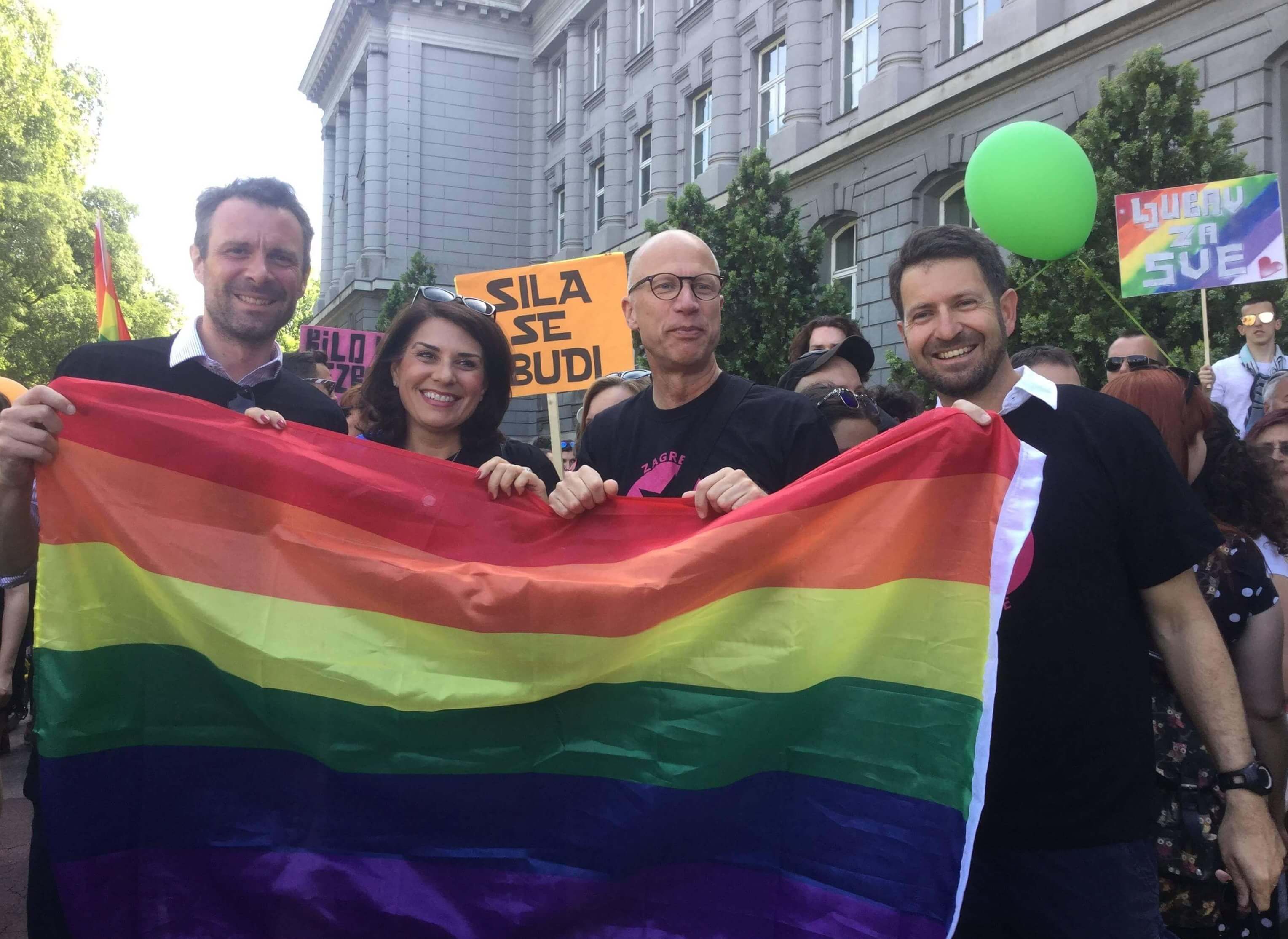
Zagreb Pride, Ambassador Dalgleish with other diplomatic colleagues during Zagreb Pride © British Embassy Zagreb
Things could be better at the commercial level, but there have been improvements...
The values ambassador Dalgeish described are the basis of diplomatic relations between Britain and Croatia, but how good is this relationship, actually? Where is it at its best, and where is it at its worst, where can things be better?
''The starting point is that diplomatic relations are really, really good, and I feel lucky that the cooperation our two countries enjoy is overwhelmingly positive,'' said the Ambassador. He added that as in any close relationship, two countries might disagree about something, but to the British Ambassador, being able to disagree and be fine with that is also a sign of a strong relationship.
''One great expression of our cooperation is NATO where we're really good, very close partners,'' continued the Ambassador, even referring to the recent DEFENDER-Europe-21 exercise in Zadar.
In addition to that, the recent visit of Royal Air Force Aerobatic Team to Croatia's Krila Oluje Pilots is also a good sign of cooperation and mutual friendship.

The Royal Airforce Aerobatic Team and the Ambassador © British Embassy Zagreb
''Croatia occupies an almost unique position in terms of expertise that it can give on Southeastern Europe, as well as comprehensive understanding of what is a very complicated situation in this region,'' he said.
''All of this is very good, strong and positive, and it makes a global impact, and it's not just about how our two countries get along,'' he said.
The Ambassador also added that both Croatia and the UK are members of the Global Media Freedom Pledge and stand for freedom in the media. He also works very closely with both the Croatian Government and Croatian president Zoran Milanović to promote awareness of the threat of climate change.
''You'd expect me to say I communicate the most with the Ministry of Foreign Affairs, and it would be true, it's where diplomatic relations are grown in a formal way. But I also communicate with all branches of the Government, with Parliament and with Pantovčak. Just today, I've been to the ''Dr Fran Mihaljević'' Clinic for Infectious Disease in Zagreb where I talked with its director, Professor Alemka Markotić, about what we can do about COVID-19“, added the Ambassador.
However, as expected, there are areas in which British-Croatian cooperation could be much better.
''Where I'd like things to be better, speaking very frankly, is in commercial relations. The UK has been less present on Croatian market and less accessible due to simple geography, especially when compared to the likes of Austria or Germany. When I arrived here, this is where I said I'd want to try to make a difference. I have made a difference, I hope. A small difference, but its a difference in the right direction, and the commercial relationship is better for that today,'' said the Ambassador.
These small steps saw trade in goods between the United Kingdom and Croatia increase by about 10% in the past few years, a good indicator of how things have been advancing, regardless of the concerns in the past that Brexit might affect it negatively.
''We've also seen investments from the Croatian side into the UK increase in the past few years – for example, Mate Rimac has just opened his research & development centre in the UK – we did help facilitate that through our Department for International Trade (DIT)“, added Ambassador.
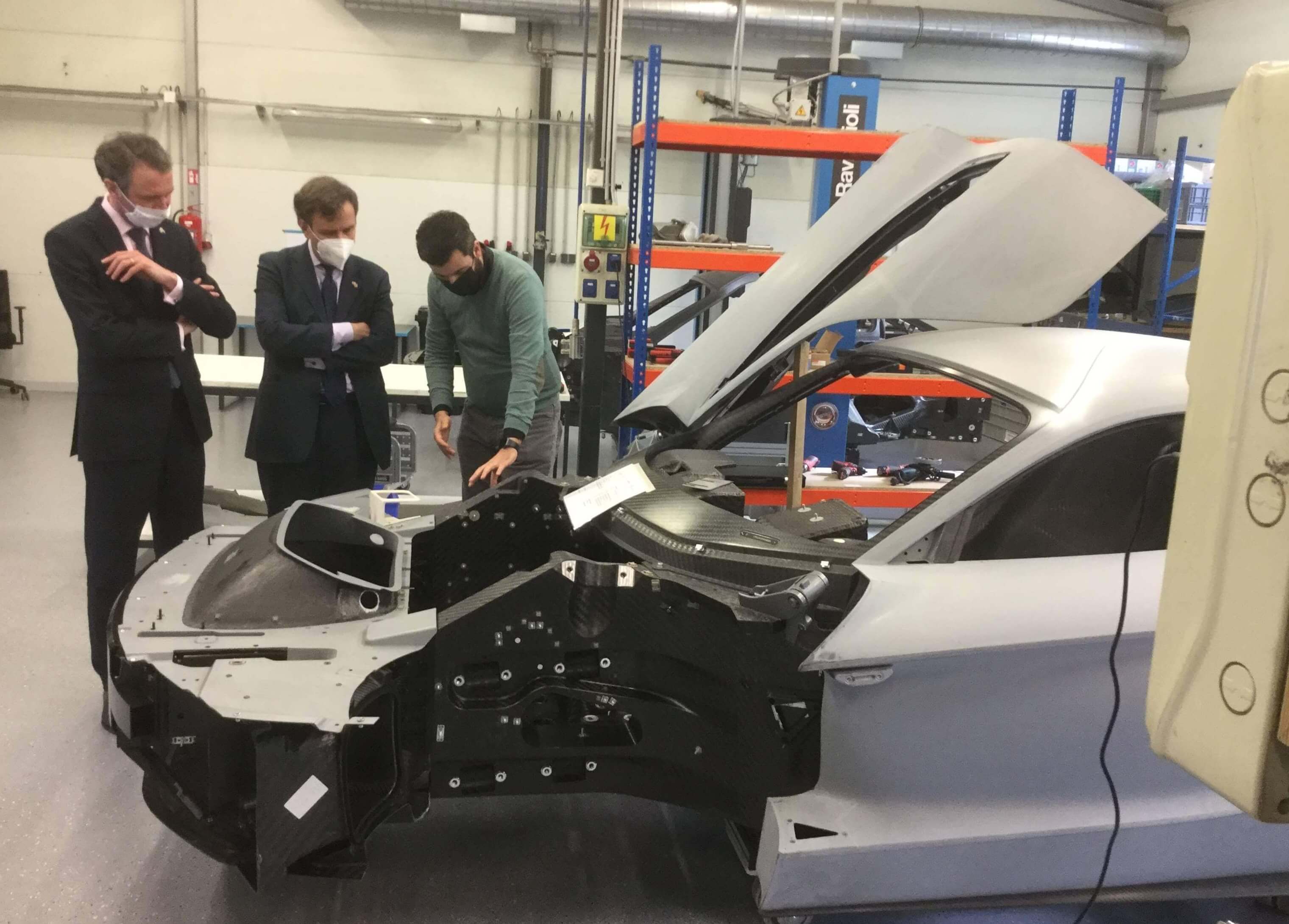
UK Minister Greg Hands and Ambassador Andrew Dalgleish with Mate Rimac in Rimac Automobili © British Embassy Zagreb
In addition, the Ambassador used every opportunity to facilitate business and trade contacts between the UK and Croatia. When UK State Secretary in the Ministry of International Trade, Greg Hands, visited Croatia last month, the Ambassador hosted a dinner for him with several leading Croatian business figures for both sides to explore how they might further improve business connections between the two countries.
On top of that, the recent confirmation from the Justice Ministry that British citizens may purchase property in Croatia only further benefited the development of trading between the two European countries.
Leaving the table for face to face conversation
The cooperation Ambassador Dalgeish described sounds great, but when it comes to diplomatic relations with the UK, the elephant in the room screams out in need of a special mention. Brexit remains a hot topic for the British public, and as Croatia is a member of the EU, what changes can Croatia expect in diplomatic relations with the UK as the European island nation which chose to step away from the bloc?
Dalgleish sees Brexit both as a challenge and as an opportunity to deepen diplomatic relations between the UK and Croatia.
''With 28 members states as it was before, you had so many people around the table that when ministers came together for a council meeting, there were just too many people to have a meaningful conversation one on one. So you'd say ''see you in Brussels'', and you would, and you'd wave, and you'd smile, and you might even say hello. But you don't have a meaningful conversation all the time,'' said Ambassador Dalgeish from his own recollection as he spent a lot of time in Brussels.
''We aren't at that table anymore. That means we're going to have to make more of an effort but also that we will have the opportunity to build a more meaningful relationship with Croatia and I think that's quite exciting for me in the job that I do,'' said ambassador Dalgleish calmly but optimistically.
''Whereas before, our bilateral business might have been conducted during these convenient moments in Brussels at these meetings, that doesn't happen anymore. Now, we will hold them in London, and we will hold them in Zagreb. I think that's quite the opportunity to build something more meaningful than what we had in Brussels,'' stated the Ambassador.
As the UK has a massive impact on the world and can boast of very strong diplomatic relations with other big players on the geopolitical stage, I wondered how important the relationship with Croatia actually is, from the UK's point of view, and in regards to the country's interest in global affairs.
''We look at Croatia as a global partner, and not just from the point of what we get from this bilaterally, but in what we're doing together to make a difference; Croatia sits as a partner,'' the Ambassador pointed out.
Already having mentioned the importance of Croatia's knowledge on Southeastern Europe and the instances of good cooperation through NATO, and issues such as climate change or COVID-19, the British Ambassador's claims are evidently backed up.
''I was sent here by the Foreign Secretary with a very serious mission to deepen the strength of the cooperation that we enjoy. It's a very important mission for me, and I think that's a reflection of how seriously we take the relationship with Croatia,'' confirmed the Ambassador.
The British Royal Family has always been very welcome in Croatia
The Ambassador already mentioned cultural exchange, and the British Embassy as an institution plays a significant role in the cultural promotion of the country. But, given the UK consists of four nations: England, Scotland, Wales, and Northern Ireland, is it possible to represent all these cultures equally? Being Her Majesty Queen Elisabeth II's Ambassador and representing the United Kingdom of Great Britain And Northern Ireland, Dalgeish shows his dedication to the job by equally representing all of the UK's four nations.
''We will proudly fly the St. George's Cross when it's St George's Day for England, but also the Saltire (Scottish flag), when it's St. Andrew's Day. I wouldn't say there is one element of the four nations that is dominant,'' said the Ambassador.
Culture is heavily linked with history, and the UK has been known in the past as a vast empire with colonies that are sovereign independent countries today. As Croatia was never colonised by the UK, are there any differences between the UK's relations with Croatia compared to other countries?
''The UK has a very long list of diplomatic relations, both with the countries who are part of Commonwealth, who were previously colonies, and with countries who were not colonised. So, there's no difference in forming a relationship with Croatia in comparison to such countries. There's nothing I can do about what happened in 1600's or 1700's, but I want to see what we can do in 2021,'' said the Ambassador, stating that the Ambassador's job is to look ahead, not backwards, to work on building the future, while acknowledging all the sensitivities of the past.
As the Ambassador already mentioned, his regular cooperation with the official bodies of the Republic of Croatia is the formal level of communication, while cultural exchange also has a key element in non-formal communication, particularly in education.
''I love going to schools. Talking to the kids about what they think about the UK, and what can they teach me about Croatia, and going to English lessons and causing chaos,'' said the Ambassador on his experiences with the school system in Croatia.
With the mention of the school system in Croatia, I couldn't help but recall my experience in education. Croatians seem to be quite talented when it comes English, but it is mostly pushed towards the American version of English.
''Oh yes I know, it's tragic,'' Ambassador Dalgleish joked in response when I shared my recollections.
He continued by saying that he is happy to see Croats speaking English so excellently, and he doesn't mind what version they learned, nor does he have any intention to have British English compete with American English.
''I don't hear too many American accents when talking to Croats, maybe it has something to do with British TV shows, maybe it doesn't, I don't know. But either way Croats should be very proud of how well they speak English,'' he concluded.
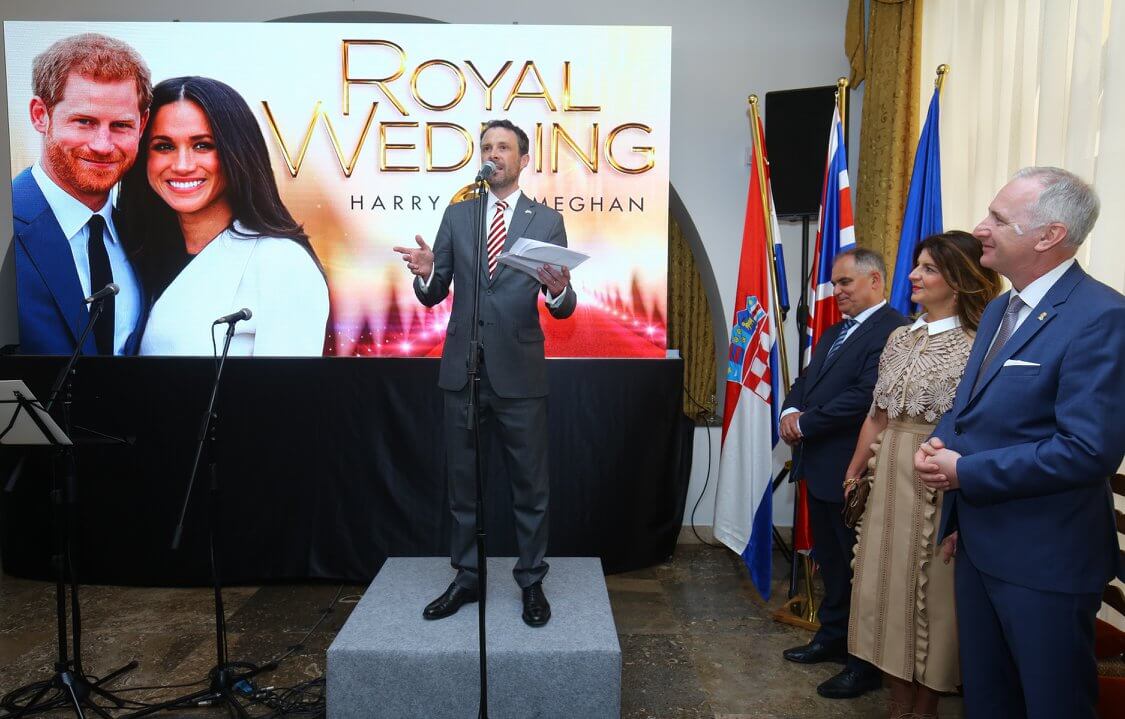
Ambassador Dalgleish on the Royal Wedding Party in Split © British Embassy Zagreb
As also already mentioned, the Royal Family is a big part of the of the fabric of Britain as it is a parliamentary monarchy.
The Royal family, particularly Prince Charles and Duchess Camilla seem to be very fond of Croatia indeed. Their last visit back in 2016 (following the Prince's earlier visit in 1996) saw the meeting with former Prime Minister Tihomir Orešković, former President Kolinda Grabar Kitarović, for whom Prince Charles highlighted his particular interest in the Croatian economy, as well as an interest in investing in Croatian youth. They also attended the commemoration of the 400th anniversary of the death of the famous English writer and poet William Shakespeare at the Croatian National Theatre (HNK) in Zagreb.
''Their Christmas card even had a photo of them with the members of a folk band from Osijek“, said Ambassador Dalgleish referring to the photo the British Royals took with the dancers of the HKUD 1862 ensemble.
And as Glas Slavonije reported, Osijek is very special to Prince Charles as his Great Grandfather Franz von Teck was born there.
Most recently, however, the Royal Family suffered a tragic loss as the much-loved Prince Philip passed away. Croatian Prime Minister Andrej Plenković expressed his deep condolences to Queen Elizabeth II publicly on Twitter, but as the Ambassador pointed out, he also sent condolences through official channels. Social media and overall technological progress now allows world leaders to communicate more directly, but it doesn't diminish the role of the British Embassy.
''Everyone who wanted to express their condolences, expressed them, from Pantovčak, to Parliament and the Government. Social media is an additional tool for us regarding public statements, but of course, embassies remain here for those sensitive issues that need to be discussed Government to Government, not over social media. We're also here for our citizens, and we can't be present in the whole country, so travelling, but also social media, are also very important here,'' explained the Ambassador.
The always attractive Dubrovnik was found to be the best example when it comes to culture in the country, as Game of Thrones and Star Wars were filmed there.
In the UK, the film industry, in addition to private incentives, gets financial support from the state, as the British Film Institute (BFI) is sponsored by a Government department. Following the examples of Star Wars and GoT, could there be more promotion from the BFI of Dubrovnik or Croatia in general as a good filming location?
''I don't really need to say anything about Dubrovnik. Dubrovnik speaks for itself, and more Brits visit Dubrovnik annually than anyone else,'' said the Ambassador with delight.
But if Dubrovnik did happen to need a good word or two; the Ambassador stated that he is not the tourist bord, and promoting Dubrovnik is not part of his duties.
''If someone from the UK contacts me and says that wants to film anywhere in Croatia, but is facing problems, then I'm here. But in general, the less I need to intervene, the better“, said the Ambassador adding that he found out about UK film producers filming in Croatia after it had already happened. One of the more recent examples of that was the filming of the ''The Ipcress File'' series in Zagreb, and the fact that the ambassador didn't need to intervene again only proves the steady and good relations between the nations.
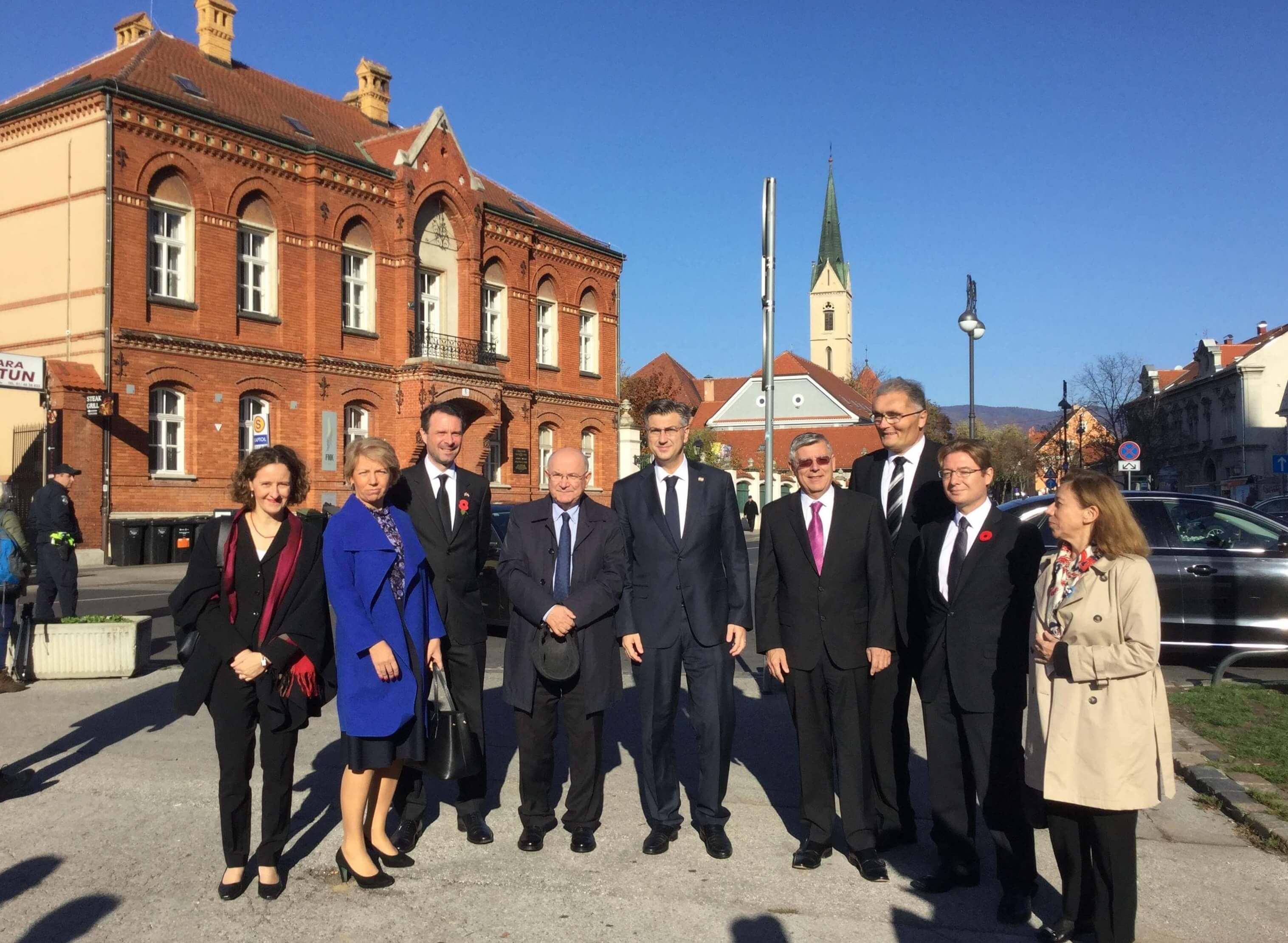
Ambassador Dalgleish, other Ambassadors and Croatian officials attending a Mass for all victims of WW2 at the Zagreb cathedral © British Embassy Zagreb
British and Croatian Ambassadors: Swapping countries but closely talking and cooperating
Foreign embassies, of course, are in Croatia for foreign citizens, and the British Embassy is no exception to that rule.
In addition to the British Embassy and a consul in Zagreb, the UK has two additional consuls: in Split and Dubrovnik, to make sure it is present for UK citizens, not just visitors, but also for Brits who work and live in Croatia.
''We have an honorary consul in Dubrovnik, which isn't officially part of the embassy, but is there to assist our citizens visiting Dubrovnik,'' pointed out Ambassador Dalgleish praising honorary consul Mark Thomas for doing a great job.
When it comes to Croats, visas to visit the UK are luckily not needed, but Croatian citizens can contact the embassy to get more information about Great Britain should they need to.
''When it comes to trying to invest in the British market or getting their products or expertise into the UK, Croats need to contact the Croatian Embassy in London. I'm frequently in contact with the Croatian Ambassador there, Igor Pokaz, who is doing a brilliant job for our two countries to fund and nurture different ways of cooperation,'' explained the Ambassador when discussing his relationship with the Croatian Ambassador in London, Igor Pokaz.
Overall, British-Croatian diplomatic relations are good in general, and the Ambassador's assurance that Brexit can be an opportunity to deepen the already good relationship is a promise to the bright future of friendship. But, as it takes two to have a combo as good as fish & chips, Croatia also has to show that it is willing to continue to develop a good friendship with the UK.
If you're a British citizen or a Croatian citizen in need of information, here is how you can reach a British diplomatic mission in Croatia:
In Zagreb:
British Embassy
Adress: Ivana Lučića 4
Mail: This email address is being protected from spambots. You need JavaScript enabled to view it.
Phone number: +385 1 60 09 100
British Council (for cultural realations):
Adress: Savska 32
Mail: This email address is being protected from spambots. You need JavaScript enabled to view it.
Phone number: +385 1 48 99 504
More info on British Council official website.
In Split:
British Consulate
Adress: Obala Hrvatskog narodnog preporoda 10/III
Phone number: +385 1 60 09 100
In Dubrovnik:
British Honourary Consulate
Address: PP 454
Phone number: + 385 1 60 09 100
For all the latest news about the British Embassy straight from the source, visit their official website. You can also follow them on Facebook, Youtube, Flickr, Instagram and Twitter (the British Ambassador is on Twitter and Instagram too).
To read more from the series "Friends of Croatia", follow TCN's dedicated page.
For more about UK - Croatia relations, follow TCN's dedicated page.


